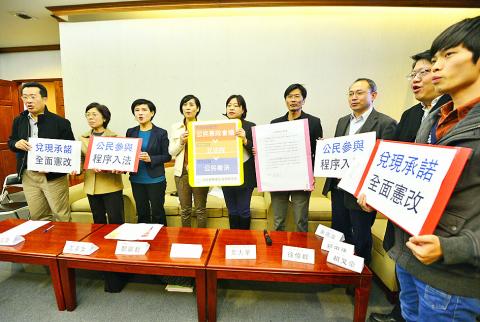Civic groups plan to push for “bottom-up” constitutional reforms and prepare constitutional amendment proposals for referendums by 2018, the Civic Alliance to Promote Constitutional Reform said yesterday.
The alliance, which was formed in 2014, told a news conference that its efforts would focus on two issues — lowering the voting age and reducing the threshold of the minimum percentage of votes a party must receive to be apportioned legislator-at-large seats.
According to the alliance, members of the public and legislators are to be jointly involved in the drafting of constitutional amendment proposals, which are to be submitted to popular referendum to coincide with the 2018 local elections for county commissioners and city mayors.

Photo: Wang Yi-sung, Taipei Times
The drafting process is to be split into three stages: research, consultation and deliberation, the alliance said.
Hsu Wei-chun (徐偉群), a member of the alliance’s executive committee, said that its goals are to enlist the legislature in jump-starting constitutional reforms, to have members of the public and lawmakers work together in overcoming the stringent legal threshold for constitutional referendums, and to use action to improve the awareness of the nation as a “constitutional and political community.”
Taiwan Alliance for the Advancement of Youth Rights and Welfare secretary-general Yeh Da-hua (葉大華) said the Chinese Nationalist Party’s (KMT) obstruction in the legislature in July last year defeated proposals to amend the minimum voting age and the percentage threshold in votes to elect legislators-at-large, despite a national consensus supporting such proposals.
As Democratic Progressive Party (DPP) Chairwoman Tsai Ing-wen (蔡英文) has been elected as the next president, she now has a duty to carry through her campaign promises to support those constitutional amendments, Yeh added.
Lawmakers at the news conference said they would support the proposed constitutional amendments in the legislature.
DDP Legislator Cheng Li-chun (鄭麗君) said that as a constitutional amendment committee member present during the breakdown in negotiations last year, she blames the KMT and the “top-down” approach to amending the Constitution for the failure to ratify the two proposals.
A “bottom-up” strategy proposed by the alliance has a better chance of breaking the gridlock of political elites and their concerns for political self-interest by relying on deliberative democracy to open a path, Cheng said.
DPP Legislator Yu Mei-nu (尤美女) said she considers the alliance’s plan “innovative,” adding that she would support it in the legislature, while New Power Party Legislator Kawlo Iyun Pacidal also pledged to support the proposed amendments.
DPP Legislator Chen Chi-mai (陳其邁) said past efforts to introduce “top-down” constitutional reforms through the legislature did not produce the results the people wanted, adding that he supports the spirit and institutional framework of the alliance’s plan, adding that he believes there is also “room for discussion on its procedural matters.”

The manufacture of the remaining 28 M1A2T Abrams tanks Taiwan purchased from the US has recently been completed, and they are expected to be delivered within the next one to two months, a source said yesterday. The Ministry of National Defense is arranging cargo ships to transport the tanks to Taiwan as soon as possible, said the source, who is familiar with the matter. The estimated arrival time ranges from late this month to early next month, the source said. The 28 Abrams tanks make up the third and final batch of a total of 108 tanks, valued at about NT$40.5 billion

Two Taiwanese prosecutors were questioned by Chinese security personnel at their hotel during a trip to China’s Henan Province this month, the Mainland Affairs Council (MAC) said yesterday. The officers had personal information on the prosecutors, including “when they were assigned to their posts, their work locations and job titles,” MAC Deputy Minister and spokesman Liang Wen-chieh (梁文傑) said. On top of asking about their agencies and positions, the officers also questioned the prosecutors about the Cross-Strait Joint Crime-Fighting and Judicial Mutual Assistance Agreement, a pact that serves as the framework for Taiwan-China cooperation on combating crime and providing judicial assistance, Liang

A group from the Taiwanese Designers in Australia association yesterday represented Taiwan at the Midsumma Pride March in Melbourne. The march, held in the St. Kilda suburb, is the city’s largest LGBTQIA+ parade and the flagship event of the annual Midsumma Festival. It attracted more than 45,000 spectators who supported the 400 groups and 10,000 marchers that participated this year, the association said. Taiwanese Designers said they organized a team to march for Taiwan this year, joining politicians, government agencies, professionals and community organizations in showing support for LGBTQIA+ people and diverse communities. As the first country in Asia to legalize same-sex

MOTIVES QUESTIONED The PLA considers Xi’s policies toward Taiwan to be driven by personal considerations rather than military assessment, the Epoch Times reports Chinese President Xi Jinping’s (習近平) latest purge of the Chinese People’s Liberation Army (PLA) leadership might have been prompted by the military’s opposition to plans of invading Taiwan, the Epoch Times said. The Chinese military opposes waging war against Taiwan by a large consensus, putting it at odds with Xi’s vision, the Falun Gong-affiliated daily said in a report on Thursday, citing anonymous sources with insight into the PLA’s inner workings. The opposition is not the opinion of a few generals, but a widely shared view among the PLA cadre, the Epoch Times cited them as saying. “Chinese forces know full well that